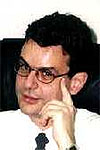II. Who is or Should Be Subject to Euthanasia? The Problem of Dualism vs. Reductionism
With the exception of radical animal rights activists, most philosophers and laymen consider people - human beings - to be entitled to "special treatment", to be in possession of unique rights (and commensurate obligations), and to be capable of feats unparalleled in other species.
Thus, opponents of euthanasia universally oppose the killing of "persons". As the (pro-euthanasia) philosopher John Harris puts it:
Ronald Dworkin emphasizes the investments - made by nature, the person involved, and others - which euthanasia wastes. But he also draws attention to the person's "critical interests" - the interests whose satisfaction makes life better to live. The manner of one's own death may be such a critical interest. Hence, one should have the right to choose how one dies because the "right kind" of death (e.g., painless, quick, dignified) reflects on one's entire life, affirms and improves it.
But who is a person? What makes us human? Many things, most of which are irrelevant to our discussion.
Broadly speaking, though, there are two schools of thought:
(i) That we are rendered human by the very event of our conception (egg meets sperm), or, at the latest, our birth; or
(ii) That we are considered human only when we act and think as conscious humans do.
The proponents of the first case (i) claim that merely possessing a human body (or the potential to come to possess such a body) is enough to qualify us as "persons". There is no distinction between mind and abode - thought, feelings, and actions are merely manifestations of one underlying unity. The fact that some of these manifestations have yet to materialize (in the case of an embryo) or are mere potentials (in the case of a comatose patient) does not detract from our essential, incontrovertible, and indivisible humanity. We may be immature or damaged persons - but we are persons all the same (and always will be persons).
Though considered "religious" and "spiritual", this notion is actually a form of reductionism. The mind, "soul", and "spirit" are mere expressions of one unity, grounded in our "hardware" - in our bodies.
Those who argue the second case (ii) postulate that it is possible to have a human body which does not host a person. People in Persistent Vegetative States, for instance - or fetuses, for that matter - are human but also non-persons. This is because they do not yet - or are unable to - exercise their faculties. Personhood is complexity. When the latter ceases, so does the former. Personhood is acquired and is an extensive parameter, a total, defining state of being. One is either awake or asleep, either dead or alive, either in a state of personhood or not
The latter approach involves fine distinctions between potential, capacity, and skill. A human body (or fertilized egg) have the potential to think, write poetry, feel pain, and value life. At the right phase of somatic development, this potential becomes capacity and, once it is competently exercised - it is a skill.
Embryos and comatose people may have the potential to do and think - but, in the absence of capacities and skills, they are not full-fledged persons. Indeed, in all important respects, they are already dead.
Taken to its logical conclusion, this definition of a person also excludes newborn infants, the severely retarded, the hopelessly quadriplegic, and the catatonic. "Who is a person" becomes a matter of culturally-bound and medically-informed judgment which may be influenced by both ignorance and fashion and, thus, be arbitrary and immoral.
Next Page 1 | 2 | 3 | 4 | 5 | 6 | 7 | 8
(Note: You can view every article as one long page if you sign up as an Advocate Member, or higher).




